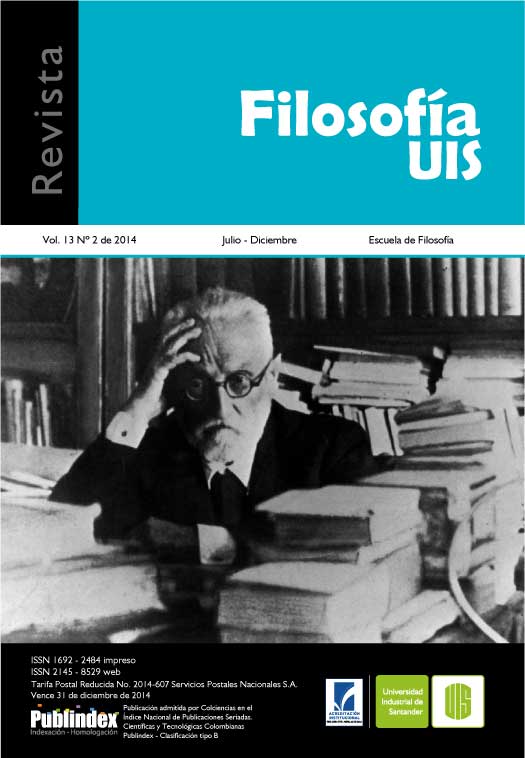Religion, secularism and justice. Habermas´ account of the role of religion in the public sphere and the aristotelian virtue of justice
Published 2014-11-04
Keywords
- justice,
- religion,
- Habermas,
- Aristotle,
- public sphere
How to Cite
Copyright (c) 2015 Javier Orlando Aguirre Román, Alonso Silva Rojas

This work is licensed under a Creative Commons Attribution 4.0 International License.
Abstract
In this article we propose that Habermas´ account of the role of religion in the public sphere follows the Aristotelian model of distributive justice. After presenting a way in which Aristotle´s notion of distributive justice can be used to assess participation within political debates, the text will relate such a presentation with Habermas´ discussion on the role of religion in the public sphere of a deliberative democracy. Finally, in the third part of the text, we will present some conclusions.
Downloads
References
- Aguirre, J. (2012). “Habermas y la religión en la esfera pública”. Ideas y Valores. Volumen LXI (148). pp. 59-78.
- Aristóteles (2011). “Ética Nicomáquea”. En: Aristóteles. Tomo II. Ética Nicomáquea, Política, Retórica, Poética. Madrid: Gredos.
- Baumeister, A. (2011). “The Use of “Public Reason” by Religious and Secular Citizens: Limitations of Habermas' Conception of the Role of Religion in the Public Realm”. Constellations. Volume 18 (2). pp. 222-243.
- Bernstein, R. (2010). “Naturalism, Secularism, and Religion: Habermas’s Via Media”. Constellations. Volume 17 (1). pp. 155-166.
- Boettcher, J. (s.f.). (2009). “Habermas, Religion and the Ethics of Citizenship”. Philosophy and Social Criticism. Volumen 35 (1-2). pp. 215 – 238.
- Cerella, A. (2012). “Religion and the Political Form: Carl Schmitt´s Genealogy of Politics as Critique of Jurgen Habermas Post – Secular Discourse”. Review of International Studies. Volumen 38 (5). p. 975–994.
- Chambers, S. (2007). “How Religion Speaks to the Agnostic: Habermas on the Persistent Value of Religion”. Constellations. Volume 14 (2). pp. 210-223.
- Cooke, M. (2006). “Salvaging and secularizing the semantic contents of religion: the limitations of Habermas’s postmetaphysical proposal”. International Journal of Philosophy of Religion. 60. pp. 187–207.
- Cooke, M. (2007). “A Secular State for a Postsecular Society? Postmetaphysical Political Theory and the Place of Religion”. Constellations. Volume 14 (2). pp. 224-238.
- Garzón, I. (2010). “Los dilemas del carácter público de los argumentos filosóficos y religiosos en el liberalismo de John Rawls”. Praxis Filosófica. (30). pp. 39–64.
- Garzón, I. (2012). “Deliberación democrática y razones religiosas: objeciones y desafíos”. Revista Co-herencia. Volumen 9 (16). pp. 81-117.
- Habermas, J. (2006). Entre naturalismo y religión. Madrid: Paidos.
- Habermas, J. (2006b). “On the Relations Between the Secular Liberal State and Religion”. Political Theologies. Public Religions in a Post-Secular World. Hent de Vries and Lawrence E. Sullivan (eds.). pp.251-260. New York: Fordham University Press.
- Habermas, J. (2008). Between Naturalism and Religion. Cambridge: Polity Press.
- Hoyos, G. et al. (2011). Filosofía política: entre la religión y la democracia. Bogotá: Pontificia Universidad Javeriana.
- Lafont, C. (2007). “Religion in the Public Sphere: Remarks on Habermas’s Conception of Public Deliberation in Postsecular Societies”. Constellations. Volumen 14 (2). pp. 239 – 259.
- Lafont, C. (2009). “Religion in the Public Sphere”. Philosophy and Social Criticism. Volumen 35 (1-2), pp. 127-150.
- Lockwood, Th, C. (2006). “Ethical Justice and Political Justice”. Phronesis: A Journal for Ancient Philosophy. Volume 51 (1). pp. 29-48.
- Rawls, J. (1997). “The Idea of Public Reason Revisited”. The University of Chicago Law Review. (64). pp. 765–807.
- O’Connor, D. (1988). “Aristotelian Justice as a Personal Virtue”. Midwest Studies in Philosophy (13). pp. 417-427.
- Singh, A. (2012). “Habermas” Wrapped Reichstag: Limits and Exclusions in the Discourse of Post – Secularism”. Volumen 20 (1). pp. 131–147.
- Young, Ch. (2006). “Aristotle’s justice” R. Kraut (ed.). The Blackwell Guide to Aristotle’s Ethics. Cambridge: Blackwell. Walhof, D. “Habermas, Same-Sex Marriage and the Problem of Religion in the Public Life”. Philosophy and Social Criticism. Volumen 39 (3). pp. 225–242.
